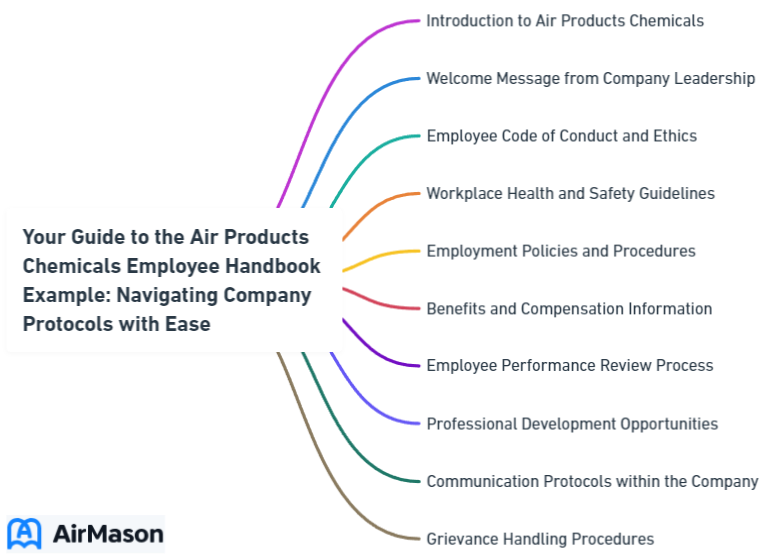
Our article cuts to the chase of an Air Products Chemicals employee handbook example, outlining key policies and employee expectations. Delve into the essential elements that embody the company’s approach to integrity, safety, and employee development.
Key Takeaways
- Air Products & Chemicals prioritizes a culture of inclusivity, with values of integrity, safety, and respect guiding the company’s ethical conduct and workplace environment, which includes comprehensive employee development and rights protection.
- The company offers a competitive equity compensation package that includes Non-Qualified Stock Options, Incentive Stock Options, and Restricted Stock Units, each with distinct advantages and tax implications, designed to align employee interests with company success.
- Air Products & Chemicals implements rigorous workplace policies and procedures encompassing conduct and ethics, health and safety regulations, and communication protocols, and provides a structured approach to employment changes such as promotions, transfers, and terminations, maintaining professional standards and legal compliance throughout.
Employee Handbook Examples
Employee handbook examples play a crucial role in guiding organizations and their workforce. Examining well-crafted employee handbook examples provides insights into effective communication, clear policies, and inclusive practices. These examples serve as templates for businesses to outline expectations, company culture, and essential procedures. By exploring diverse employee handbook examples, companies can tailor their own documents to align with industry standards while addressing the unique needs of their workforce. In essence, “employee handbook examples” exemplify best practices, serving as valuable resources for organizations striving to create comprehensive and engaging guides for their employees.
Understanding Air Products & Chemicals Employee Handbook
Air Products & Chemicals, a global leader in gases, technologies, and services for the industrial gases industry, champions the values of inclusivity, individual input, and teamwork. These deeply rooted values are reflected in the company’s Code of Conduct, which takes into account the diverse perspectives of its employees.
Employees are anticipated to uphold the principles of their employer:
- Integrity
- Ethics
- Fairness
- Respect
This commitment to ethical conduct not only contributes to the fair market value of the company’s stock, but it also creates a supportive and harmonious workplace culture where every employee can thrive.
Company Culture and Core Values
Inclusivity and collaboration form the bedrock of the culture at Air Products & Chemicals. No matter your role or your background, you’re a valued member of the team, and your contribution matters. The company supports employee development through various programs, including the Inclusion Network and Employee Resource Groups.
The company’s core values are:
- Integrity
- Safety
- Sustainability
- Diversity
- Respect
- Collaboration
These values are not just slogans on a wall. They’re principles that guide every business decision and interaction. So, whether you’re participating in a team meeting or working on a major project, you can trust that these values are at work at every level of the organization.

Employment Terms and Conditions
The company’s Code of Conduct governs your employment contract as an employee of Air Products & Chemicals. This means that you’re expected to adhere to safety-related policies, report unsafe conditions, and follow specific terms and conditions for the procurement of goods and services.
Your standard working hours will typically total approximately 12 hours per day, with compensation for overtime work provided at a rate of 1.5 times your hourly rate. You can also look forward to generous time off provisions, with the company offering between 15 and 20 days off per year through their PTO and Vacation policy.
Employee Rights and Responsibilities

Air Products & Chemicals presents a clear and comprehensive framework regarding your rights and responsibilities. Employees are entitled to voluntary freedom of association and the right to engage in collective bargaining. This, along with the company’s commitment to ethical conduct, means that every employee can confidently participate in the workplace knowing that their rights are respected and protected.
To uphold these standards, employees are required to comply with all Environment, Health, Safety, and Sustainability policies, standards, and procedures, and complete all necessary training. But what happens if an employee fails to fulfill their obligations? Depending on the seriousness of the infraction, disciplinary measures may be taken, including the possibility of termination.
Equity Compensation for Air Products & Chemicals Employees
Employees at Air Products & Chemicals are more than just team members. They’re also given the chance to become shareholders. The company’s equity compensation plan allows employees to choose between cash or stock options as part of their overall compensation package. This means that as you contribute to the company’s success, you also have the opportunity to share in its financial rewards.
However, equity compensation at Air Products & Chemicals doesn’t follow a one-size-fits-all approach. The company provides a range of options, including Non-Qualified Stock Options (NSOs) and Incentive Stock Options (ISOs). They also offer Restricted Stock Units (RSUs), a popular form of equity compensation.
Stock Options Explained
For those unclear on stock options, here’s a simple explanation. In simple terms, they’re a way for employees to acquire a specified number of shares in the company at a predetermined price on a future date. This means that you have the chance to buy shares of the company’s stock at a price that’s set when the options are granted, known as the strike price.
Over time, these options vest, or become ‘earned’, allowing you to actually own the granted options. This means that as long as you remain with the company, you have the potential to benefit from the company’s growth and success.
Non-Qualified Stock Options vs. Incentive Stock Options
Though both Non-Qualified Stock Options (NSOs) and Incentive Stock Options (ISOs) provide employees the leverage to buy company shares at a fixed price, their tax implications vary. NSOs are taxed upon exercise, with the income received considered as compensation income, similar to salary. On the other hand, ISOs offer tax advantages on the gains and are not subject to ordinary income tax upon exercise.
This tax treatment makes ISOs an attractive option for employees. But it’s important to note that they’re only available to employees and come with specific tax benefits, unlike NSOs which are open to a wider range of individuals.
Restricted Stock Units (RSUs)
In addition to stock options, Air Products & Chemicals also offers Restricted Stock Units (RSUs) as part of their equity compensation plan. RSUs are shares of stock granted to employees, subject to specific conditions and vesting timelines.
One of the key benefits of RSUs is that they offer:
- Fewer decisions for employees compared to other forms of equity compensation
- An incentive for employees to remain with the company over the long term
- The potential for employees to receive a significant financial advantage as the company performs well.
RSUs also offer employees flexibility, particularly in the case of a publicly traded company. By spreading the vesting of shares over several years, RSUs can help employees benefit from the gradual appreciation of the company’s stock value.
Navigating Compensation and Benefits

While understanding compensation and benefits at Air Products & Chemicals may appear complex, the right knowledge can make it a fulfilling part of your employment experience. From salary to equity compensation and benefits, the company offers a comprehensive package that reflects your value and contribution to the team.
When it comes to negotiating your compensation package, it’s important to consider both your cash salary and your equity compensation. And when assessing a compensation offer, don’t forget to take a holistic view, considering not only your salary but also your equity compensation and benefits.
Moreover, Air Products & Chemicals employees can enhance their compensation value through tax-optimized strategies. By directing equity compensation proceeds into tax-advantaged accounts such as Roth 401(k)s, you can maximize your financial reward.
Intuit Employee Handbook Example
In this illustrative Intuit Employee Handbook Example, we delve into the comprehensive guidelines and policies that govern the working relationship between Intuit and its employees. The Intuit Employee Handbook serves as a vital resource, offering insights into the company’s values, expectations, and commitment to fostering a positive workplace culture. From onboarding procedures to code of conduct, the handbook encapsulates the essence of Intuit’s dedication to creating an inclusive and productive work environment. This exemplary guide not only outlines the rights and responsibilities of employees but also reflects Intuit’s ongoing efforts to adapt to evolving industry standards and prioritize the well-being of its workforce. Explore the following sections to gain a deeper understanding of how Intuit navigates the delicate balance between corporate structure and employee satisfaction.
Negotiating Your Compensation Package
Keep in mind that your compensation package negotiation isn’t solely about the cash salary. Equity compensation is a key component of your package at Air Products & Chemicals, so be sure to give it serious consideration. And don’t forget about the other benefits that the company offers, from paid vacation to insurance benefits.
Negotiating your pay isn’t just a one-time event. It’s something you should revisit regularly, particularly during performance reviews. By setting clear goals and demonstrating your contribution to the company, you can position yourself for higher compensation.
Evaluating Your Compensation Offer
Assessing your compensation offer constitutes a significant step in your career trajectory at Air Products & Chemicals. This is where you’ll need to consider all aspects of your offer, from cash salary to equity compensation.
Remember, equity compensation is not just about the present. It’s also about your long-term wealth accumulation. The company stock options plan enables employees to purchase company stock at a predetermined price, offering potential for long-term financial growth.
Diversification is another factor to consider. By spreading your investments across different assets and sectors, you can reduce risk and potentially achieve higher returns.
Tax-Optimized Sales and Investment Strategies
Consider the tax implications as a key aspect of your compensation package. By implementing tax-optimized strategies, you can maximize the value of your compensation at Air Products & Chemicals. One approach is to direct equity compensation proceeds into tax-advantaged accounts such as Roth 401(k)s. By doing so, you can enjoy tax-free growth and withdrawals. Leaving the company? Consider investing before you depart to lessen Medicare taxes, or submit an 83(i) Election to postpone NSO taxes for 5 years.
In managing equity compensation, treat it like your cash salary. Here are some tips:
- Assess comparable companies and pertinent metrics
- Explore investments in materials equity mutual funds
- Look for companies demonstrating sustainable dividend growth
Workplace Policies and Procedures at Air Products & Chemicals
Air Products & Chemicals, like all organizations, implements workplace policies and procedures to cultivate a professional and supportive work environment. These policies cover everything from conduct and ethics to health and safety regulations and communication protocols.
Adhering to these policies goes beyond simply following the rules. It’s about upholding the company’s values of integrity, ethical behavior, and respect for individuals. And non-compliance can have serious consequences, including termination of employment and legal action.
Code of Conduct and Ethics
The Code of Conduct and Ethics at Air Products & Chemicals includes the following key points:
- It is a reflection of the company’s culture and values
- It emphasizes the importance of integrity and ethical behavior
- It encourages employees to behave in a manner that upholds these values
The Code also includes specific diversity and inclusion policies, making it clear that discrimination is not tolerated. This commitment to diversity and inclusion not only creates a supportive and respectful workplace environment, but also ensures that every employee can contribute to the company’s success.
Health and Safety Regulations
Safety at Air Products & Chemicals extends beyond being merely a policy. It’s a fundamental value that guides the company’s operations. The company adheres to all relevant environmental, health, and safety legislation, and offers training in:
- Environment
- Health
- Safety (EH&S)
- Sustainability
From providing essential safety guidance and training for the proper use and management of gases to striving for zero accidents and incidents, the company’s commitment to safety is evident. And it’s not just about physical safety. The company also places a strong emphasis on the mental well-being of employees, fostering a culture of inclusivity and respect.
Communication and Reporting Procedures
For the seamless operation of any organization, including Air Products & Chemicals, effective communication is vital. The company has established guidelines for managing internal communications, with a strong commitment to non-retaliation for employees who report violations or suspected violations. This commitment extends to the company’s approach to employee complaints and grievances. Employees are encouraged to report any concerns or suspicions regarding non-compliance, safe in the knowledge that the company will take their concerns seriously and will not tolerate any form of retaliation.
In addition to fostering a culture of transparency and accountability, the company’s communication framework is designed to maintain a consistent visual identity, elevating the company’s reputation as a prominent global entity in the marketplace.
Managing Employment Changes and Transitions
Whether it’s a promotion, transfer, or termination, career transitions at Air Products & Chemicals are handled with the utmost care and respect. The company has established clear procedures for these transitions, ensuring that every employee is treated fairly and professionally.
When it comes to promotions and transfers, performance reviews play a key role in the decision-making process. And for those facing termination, the company provides a clear explanation of the reasons for the decision, with the potential for severance benefits depending on the circumstances.
Promotion and Transfer Procedures
At Air Products & Chemicals, promotions and transfers involve more than just ascending the corporate hierarchy. They’re opportunities for personal and professional growth. Performance reviews form a crucial part of the promotion process, offering a structured approach to career advancement.
The company also offers rotational programs for employees, providing multiple assignments that facilitate structured growth and advancement within the company. These programs are a testament to the company’s commitment to employee development and career progression.
Termination of Employment
Air Products & Chemicals addresses the sensitive issue of employment termination with the highest degree of professionalism and respect. Employees may face termination for non-compliance with the Code of Conduct, retaliatory behavior, or violations of safety policies and procedures.
Communication is key during this process. The company communicates the termination decision clearly, explaining the reasons for the termination. And despite the challenging circumstances, terminated employees are still treated with respect. They are entitled to voluntary freedom of association and the right to bargain collectively, and may be eligible for severance benefits.
Post-Employment Obligations
Departing from Air Products & Chemicals does not absolve you of your obligations to the company. Former employees are required to maintain high standards of integrity, ethical conduct, honesty, and fairness, and to act in the best interests of the company.
This includes adhering to the company’s non-compete clause, which prohibits employees from engaging in any formal or informal arrangements with competitors to manipulate or regulate prices. Former employees are also obliged to uphold the confidentiality of any information categorized as ‘Confidential Information’ according to the company’s definition.
Breaching these post-employment obligations can have serious consequences, including disciplinary action, criminal prosecution, and legal action by the company. So even after leaving the company, it’s important to uphold the same standards of professionalism and integrity that were expected during your employment.
Legal Aspects and Employee Protection
The law provides rights and protections to every employee at Air Products & Chemicals. The company adheres to a range of laws and regulations, from data protection laws to environmental legislation. They also have measures in place to safeguard confidentiality and intellectual property rights.
And if you ever find yourself facing a workplace dispute, rest assured that the company has a grievance and dispute resolution mechanism in place. This includes a commitment to non-retaliation for individuals who report in good faith violations or suspected violations.
Compliance with Applicable Laws and Regulations
Abiding by laws and regulations is an essential part of your role at Air Products & Chemicals. The company is required to adhere to all relevant laws and regulations, from environmental legislation to data protection laws. Failure to comply can lead to serious consequences, including financial penalties, reputational harm, and even worker injuries and fatalities.
To ensure compliance, the company’s operations are overseen by the board of directors and multiple regulatory bodies. And to keep employees informed about these laws and regulations, the company offers regular training and updates through its Code of Conduct and company policies.
Boston Scientific Employee Handbook Example
In the comprehensive Boston Scientific Employee Handbook Example, employees gain valuable insights into the company’s values, policies, and expectations. This handbook serves as a vital resource, outlining the principles that guide the organization and providing employees with a clear understanding of their rights and responsibilities. From workplace conduct to benefits and beyond, the Boston Scientific Employee Handbook Example is a crucial tool for fostering a positive and productive work environment. This document reflects Boston Scientific’s commitment to creating a supportive workplace culture and ensuring that employees have the information they need to thrive in their roles.
Confidentiality and Intellectual Property Rights
Air Products & Chemicals highly values confidentiality and intellectual property rights. Employees are forbidden from divulging confidential information belonging to the company, its employees, subsidiaries, affiliates, customers, suppliers, or other business partners. Breaching confidentiality can lead to serious consequences, including termination of employment and legal action.
When it comes to intellectual property, the company holds the copyright for all the content on their website and has obtained valid rights from third parties to use the material. In the event of an invention, the employee-inventor may be required to work with the company to prepare and submit a patent application.
Employee Grievance and Dispute Resolution
While managing grievances and disputes can be tough, Air Products & Chemicals has established a clear process to address them. Employees are encouraged to report any complaints, concerns, or suspicions regarding non-compliance, knowing that the company will not tolerate any form of retaliation.
This commitment to non-retaliation extends to the dispute resolution process. The company has internal committees participating in dispute resolution, ensuring a fair and unbiased process. So whether it’s a minor disagreement or a major conflict, rest assured that your concerns will be heard and addressed with fairness and respect.
Summary
In conclusion, understanding the Air Products & Chemicals Employee Handbook is crucial to a successful career at the company. From the company’s culture and values to its compensation packages and workplace policies, every aspect of your employment journey is covered. Remember, your career at Air Products & Chemicals is not just about your role or your responsibilities. It’s about being a part of a team that values integrity, respect, and collaboration. So, whether you’re just starting out or looking to advance, take the time to understand your rights, your benefits, and your potential. After all, your success is Air Products & Chemicals’ success.
Frequently Asked Questions
What are the key aspects of the company culture at Air Products & Chemicals?
The key aspects of the company culture at Air Products & Chemicals include fostering inclusivity, acknowledging individual input, promoting teamwork among diverse backgrounds, and demonstrating dedication to sustainability and community support.
What benefits do Restricted Stock Units (RSUs) offer for employees?
Restricted Stock Units (RSUs) offer employees the advantage of fewer decisions, serving as a long-term incentive to stay with the company, and the potential for significant financial gain as the company performs well. This makes RSUs a valuable form of equity compensation.
What are the health and safety regulations that Air Products & Chemicals adheres to?
Air Products & Chemicals adheres to relevant environmental, health, and safety legislation, implementing specific policies, standards, and providing training in EH&S and Sustainability. Compliance with regulations is a top priority for the company.
What are the procedures and guidelines for employment termination at Air Products & Chemicals?
At Air Products & Chemicals, employment termination may be initiated for reasons such as non-compliance with safety policies and procedures or violation of the Code of Conduct, with disciplinary measures, including termination and/or legal recourse being considered.
What are the potential consequences if Air Products & Chemicals fails to adhere to laws and regulations?
Air Products & Chemicals may face financial penalties, reputational harm, worker injuries, property damage, and decreased production if it fails to adhere to laws and regulations. This could significantly impact the company’s operations and public standing.
Important Disclaimer:
The article presented here does not serve as a representation of the company’s actual employee handbook mentioned in this article.
Our discussions and insights regarding employee handbook are based on assumptions about what may be considered significant in the companies’ policies. These assumptions are drawn from available information and industry knowledge. Readers are advised that the content provided is for informational purposes only and should not be construed as an exact reflection of any company’s official policies or procedures. For precise and accurate details regarding a company’s employee handbook, individuals should refer directly to the company’s official documentation or consult with appropriate representatives.
Please be aware that the content on this page has been generated by using artificial intelligence language models and may contain errors, inconsistencies, or outdated information. It is provided as-is without any warranties or guarantees of accuracy. We strongly recommend using this content as a starting point for further research. We disclaim any liability for damages or losses resulting from the use or reliance on this content.
